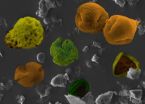Hanoi, Vietnam – One of the world's largest global scientific partnerships for sustainable agricultural development has launched a bold new research initiative that aims to dramatically improve the ability of rice farmers to feed growing populations in some of the world's poorest nations. The efforts of the Global Rice Science Partnership, or GRiSP, are expected to lift 150 million people out of poverty by 2035 and prevent the emission of greenhouse gases by an amount equivalent to more than 1 billion tons of carbon dioxide.
An initiative of the Consultative Group on International Agricultural Research (CGIAR) and led by the International Rice Research Institute (IRRI) and its partners, GRiSP was launched in Hanoi today at the 3rd International Rice Congress. The new global initiative will lead scientists to embark on the most comprehensive attempt ever to deploy rice's genetic diversity. Cutting-edge research aimed at discovering new rice genes and deciphering their functions will feed into accelerated efforts to break the yield barrier in rice and to breed new generations of "climate-ready" rice with flooding tolerance and other traits that are essential for adapting production in the face of climate change. The initiative is expected to boost supplies enough to reduce anticipated increases in rice prices by an average of at least 6.5% by 2020, and at least 13% by 2035.
"Given that rice is a staple food for more than half the global population and in most of the developing world, there is no question that availability of rice is equated with food security," said Dr. Robert Zeigler, director general of IRRI, a member of the Consortium of International Agricultural Research Centers.
According to Zeigler, GRiSP has the potential to contribute significantly to lowering food prices, which he says should lift about 72 million people out of poverty by 2020. This effect is measured by counting the lower costs as projected income gains worth US$11 billion, thus reducing global poverty by 5% by 2020 and 11% by 2035.
At the same time, GRiSP research will significantly reduce emissions of greenhouse gases from rice production through the adoption of improved irrigation methods and by avoiding deforestation. More than 1.2 million hectares of forest, wetlands, and other natural ecosystems will be saved by 2035 because rice production will not need to expand into new areas, thanks to higher rice yields.
The launch of GRiSP marks the beginning of a 5-year, nearly US$600 million endeavor. While GRiSP builds on existing research, development, and funding, it requires additional new financial support to raise annual funding for rice research from around $100 million in 2011 to $139 million in 2015 to fully realize its potential.
"GRiSP is the opening gambit in a wider campaign to secure the world's food supply within 25 years," said Mr. Carlos Pérez del Castillo, chair of the Board of the Consortium of International Agricultural Research Centers. The Consortium of Centers was formed recently in a major reorganization of the CGIAR that is responsible for providing financial support for the implementation of the CGIAR Research Programs.
"In the coming months," he added, "the CGIAR will launch further high-quality international research programs that form part of a comprehensive vision, with clear impact-oriented targets, for reduction in poverty and hunger, improvements in health and nutrition, and enhanced resilience of the world's ecosystems. We welcome the CGIAR donor support for these new programs."
The initiative will also promote revolutionary transformations in rice agronomy, processing, and policy. The overall goal will be to serve farmers and consumers by increasing yields using improved seeds and agricultural practices, and by reducing postharvest losses (estimated at 20-30 percent of developing-country production).
As part of a vigorous effort to strengthen national research capacity, this program will offer hundreds of developing-country professionals—at least 30 percent of them women—the opportunity to take part in degree programs and training courses.
This global partnership is led by IRRI along with AfricaRice and the International Center for Tropical Agriculture (CIAT) and includes two French organizations, the Centre de Coopération Internationale en Recherche Agronomique pour le Développement (CIRAD) and L'Institut de Recherche pour le Développement (IRD), as well as the Japan International Research Centre for Agricultural Sciences (JIRCAS), with hundreds of other partners worldwide representing governments, the private sector and civil society. These partners actively shaped the research agenda of GRiSP and will play key roles in its implementation. GRiSP provides an example of how the CGIAR will operate in the future, which other research programs will emulate.
GRiSP embodies the key recommendations of Never an Empty Bowl: Sustaining Food Security in Asia, an international taskforce report released in late September by IRRI and the Asia Society. Calling for new efforts to "raise and sustain the productivity of rice farmers," the report proposes innovative mechanisms to pay for this work, including one in which rice-growing nations would fund rice research on the basis of the value of domestic production.
INFORMATION:
More information
Global Rice Science Partnership (GRiSP) IRC2010 - Web site Mr. Carlos Perez del Castillo, chair of the CGIAR Consortium Board, formally launches GRiSP
Contacts
Sophie Clayton, IRRI: +63 917 552 6082, +63 2 580 5600 (extension 2204), or s.clayton@cgiar.org
Megan Dold: +1 301 280 5720 or mdold@burnesscommunications.com
Liz Clarke, CGIAR Consortium, at +31 6 19136 569 or e.clarke@cgiar.org
GRiSP—the Global Rice Science Partnership—is an international alliance with hundreds of research and development partners worldwide that represents for the first time ever, a single strategic and work plan for global rice research. GRiSP aims to reduce poverty and hunger, improve human health and nutrition, reduce the environmental footprint and enhance ecosystem resilience of rice production systems through high-quality international rice research, partnership, and leadership. The International Rice Research Institute (IRRI) leads GRiSP and principal partners within the CGIAR include AfricaRice and the International Center for Tropical Agriculture (CIAT).
The Consultative Group on International Agricultural Research (CGIAR) is a global partnership that unites organizations engaged in research for sustainable development with the funders of this work. The funders include developing and industrialized country governments, foundations, and international and regional organizations. The work they support is carried out by 15 members of the Consortium of International Agricultural Research Centers, in close collaboration with hundreds of partner organizations, including national and regional research institutes, civil society organizations, academia, and the private sector.
END


